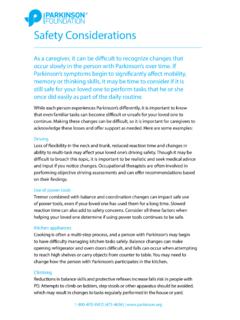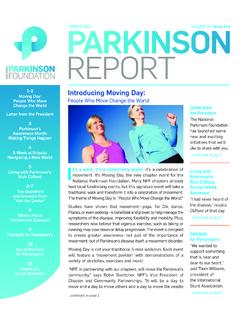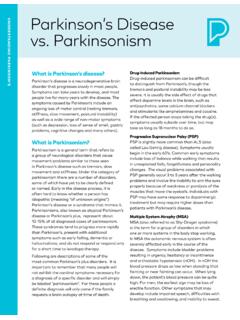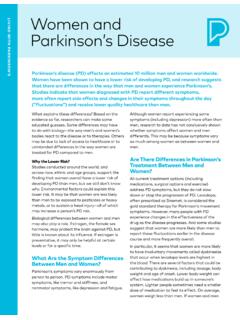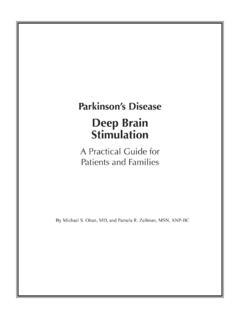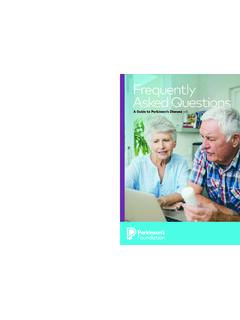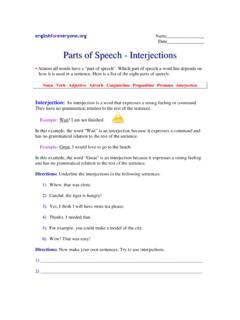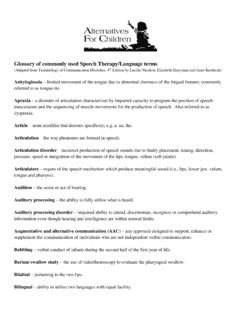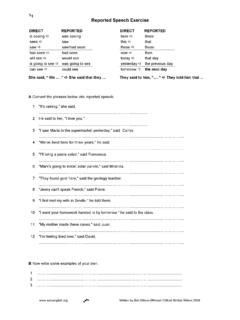Transcription of Parkinson’s Disease Speech and Swallowing
1 parkinson s Disease : Speech and SwallowingYour generosity makes this publication possibleThe National parkinson Foundation is proud to provide these educational materials at no cost to individuals around the globe. If you find these materials helpful, please consider a gift so that we may continue to fight parkinson s on all fronts: funding innovative research, providing support services, and offering educational materials such as this publication. Thank you for your support. Donate online: Donate by mail to: National parkinson Foundation Gift Processing Center Box 5018 Hagerstown, MD 21741-5018 Donate by phone: 1-800-473-4636 Tax ID: 13-1866796By:Marjorie L.
2 JohnsonMA/CCC-SLPS truthers parkinson s CenterMinneapolis, MNParkinson s Disease : Speech and SwallowingParkinson s Disease : Speech and SwallowingTable of ContentsIntroduction Speech and Swallowing Changes in parkinson s 1 Speech and Communication 2 Swallowing 3 Getting the Help You Chapter 4 Memory and Thinking A Anatomy of Speech B Anatomy of the s Disease : Speech and SwallowingIntroduction Most people with parkinson s Disease (PD) will experience changes in Speech , voice and Swallowing at some point during the course of the Disease . The same PD symptoms that occur in the muscles of the body tremor, stiffness and slow movement can occur in the muscles used in speaking and Swallowing . This can cause the following issues: Soft voice Mumbled or fast Speech Loss of facial expression Problems communicating Trouble swallowingWhile PD medications help improve many symptoms, they are not as helpful for Speech and Swallowing problems.
3 Many people report little improvement in Speech and voice with changes in medication. Still, some people do report that their voices are stronger when PD medicines are at peak people get the best improvement with Speech and Swallowing when medications are paired with a Speech therapy program. Speech -language pathologists are trained to evaluate and treat Speech , language, memory and Swallowing problems. Every person who has Speech or Swallowing changes associated with PD, whether mild or severe, is encouraged to consult with a qualified Speech -language pathologist. Your physician or other health care professional can refer you to a qualified Speech -language pathologist who can develop a personalized Speech therapy program for you. Like other symptoms of PD, difficulties with Speech and Swallowing will vary from one person to another. This book will provide you with information, tools and exercises to help you better understand and manage Speech and Swallowing s Disease : Speech and SwallowingChapter 1 Speech and Communication Challenges About 75% of people with PD experience changes in Speech and voice at some time during the course of the Disease .
4 These changes usually come on gradually and can vary from moderate to is a vital part of daily life. Problems communicating can lead to feelings of frustration, depression and withdrawal. Learning how PD affects communication and what you can do about it can help you better cope with problems that you might example, many of the problem areas can be improved with Speech therapy. Talk to your doctor or health care professional about an evaluation by a qualified Speech -language Do I Know if I Have Problems with Speech and Communication?This self-test can help you determine if you have a communication problem. Think about the following statements, and place a check mark next to the ones that apply to you. I am often asked to repeat a statement. People look slightly confused or as if they are trying hard to listen when I speak. My care partner says that I sometimes slur or mumble words.
5 My care partner asks that I speak louder. I feel that my care partner is ignoring me or may need a hearing aid. I do not attend social gatherings as often as before. I notice that I often stop trying to communicate in a group where others seem to talk over me. I feel like people do not listen to me anymore. I feel like people think that I don t have anything interesting to say. I try to avoid the telephone. I need to clear my throat often. I cannot complete a conversation without feeling frustrated about my inability to communicate what I have to you checked any of these statements, you are probably experiencing changes in communication related to s Disease : Speech and Swallowing6 Care Partner Speech and Communication SurveyIf you are a care partner, family member or friend who has regular contact with a person with PD, complete this questionnaire.
6 Check the statements that are true for your family member or friend. I have difficulty hearing when s/he speaks. I have difficulty understanding his or her Speech . S/he does not talk as much as in the past. S/he does not attend social functions as frequently as in the past. S/he often asks me to make phone calls or order from a menu for him or her. S/he clears his or her throat often. S/he often sounds as if s/he is running out of breath when speaking. S/he suspects that I need a hearing aid. S/he thinks I ignore what s/he has to you checked more than one box, your family member or friend probably has problems with Speech and Can I Do to Improve My Speech and Communication?In addition to seeing a Speech -language pathologist, there are some strategies that you, your family and your friends can use to improve Care of Your VoiceIt is important to take care of your voice.
7 Here are some simple suggestions for good voice hygiene. Drink plenty of water or other non-caffeinated, non-alcoholic liquids each day. Do not try to shout over noise when you talk. Rest your voice when it is tired. Like other muscles in your body, the muscles controlling your Speech need a break sometimes. Reduce throat clearing or coughing. Use a hard swallow or soft sound instead. Reduce or eliminate heartburn. If the air is dry in your home, use a s Disease : Speech and Swallowing7 Tips for Family and FriendsFamily and friends are often the best support system for people with PD. There are several things you can do to help your loved one communicate more first and most important thing is to encourage your family member or friend to consider Speech therapy when changes in voice and Speech are noticed. A Speech -language pathologist can develop a home exercise program tailored to his or her needs.
8 The following tips and strategies are also helpful: Look at one another when talking. Lip reading can help you understand more of the conversation. Reduce background noise. Turn off the radio and TV, close car windows and shut doors to noisy areas. Be aware that people with PD may not show facial expressions because of rigid facial muscles. Don t assume that your family member/friend does not understand your message. Don t depend on facial expression to gauge reaction. Use shorter sentences, and encourage your family member/friend to do the same. Ask questions that can be answered in a short sentence or with a yes or no. Be patient. Allow ample time for the person with PD to communicate. Don t rush or force responses. While PD does not cause hearing loss, it is more common as people age. If you suspect your family member/friend has hearing loss, a hearing aid might help.
9 Ask a physician or other health care professional about an TalkingThe best way to practice talking is to talk! Do not limit your speaking because you feel self-conscious or have difficulty. The saying use it or lost it applies to Speech , is a list of possible conversation topics. If you don t have a companion to talk to, talk out loud to yourself! Talk about your family: who is related to whom, where everyone is from, etc. Describe a favorite hobby or pastime in detail. Give a report about a trip or vacation you enjoyed. Discuss a period of time or particular event you recall from childhood. Describe your favorite food or restaurant. Give your opinion and thoughts about a favorite topic. Talk about things you hope to accomplish in the next year. Acknowledge people by sharing what it is you most appreciate about ExercisesMany individuals with PD request face and mouth exercises to reduce the effects of rigidity of muscles in the face and increase facial expression.
10 Try the exercises below to figure out which muscles need the most with 10 repetitions of each facial movement explained below. Each exercise should be completed with purposeful movements and sustained effort. For instance, if smiling is the exercise, try to smile as wide as you can, and hold each smile for 5-10 seconds. Make sure you continue to breathe throughout the exercises. Try practicing in front of a mirror, so you can see your muscles Smile hold relax Pucker your lips hold relax Alternate puckering and as tightly and smile as hard as you can. To increase the benefit of this exercise, knit your eyebrows together when you pucker, and raise the brows when you Open your mouth and move the tip of your tongue all around the lips. The tongue should touch every part of the lips: bottom, top and both corners. Movements should be deliberate, not Open your mouth and move the tongue around the gumline.

